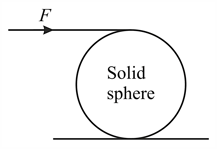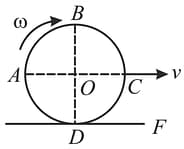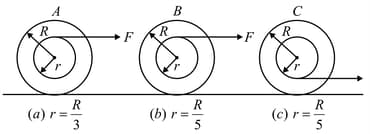MEDIUM
JEE Advanced
IMPORTANT
Earn 100
Consider three solid spheres, sphere has radius and mass sphere has radius and mass sphere has radius and mass All can be placed at the same point on the same inclined plane, where they will roll without slipping to the bottom. If allowed to roll down the incline, then at the bottom of the incline
(a)sphere will have the largest speed.
(b)sphere will have the largest speed.
(c)sphere will have the largest kinetic energy.
(d)all the spheres will have equal speeds.
50% studentsanswered this correctly

Important Questions on Rigid Body Dynamics: Part 2
MEDIUM
JEE Advanced
IMPORTANT
In the situation given, a force is applied at the top of sphere. Study following statements.

MEDIUM
JEE Advanced
IMPORTANT
A ring rolls without slipping on a horizontal surface. At any instant, its position is as shown in the figure. Then

EASY
JEE Advanced
IMPORTANT
A uniform disc is rotating at a constant speed in a vertical plane about a fixed horizontal axis, passing through the centre of the disc. A piece of disc from its rim detaches itself from the disc at the instant when it is on the same horizontal with the centre of the disc and moving upwards. Then about the fixed axis, the angular speed of the
HARD
JEE Advanced
IMPORTANT
Three spools and each having moment of inertia are placed on rough ground and equal force is applied at positions as shown in Figs, and . Then

HARD
JEE Advanced
IMPORTANT
A horizontal disc rotates freely about a vertical axis through it centre. A ring, having the same mass and radius as the disc, is now gently placed on the disc. After some time, the two rotate with a common angular velocity.
EASY
JEE Advanced
IMPORTANT
Two horizontal discs of different radii are free to rotate about their central vertical axes. One is given some angular velocity, the other is stationary. Their rims are now brought in contact. There is friction between the rims. Then
MEDIUM
JEE Advanced
IMPORTANT
A constant external torque acts for a very brief period
on a rotating system having moment of inertia , then
MEDIUM
JEE Advanced
IMPORTANT
Two identical spheres and are free to move and to rotate about their centres. They are given the same impulse . The lines of action of the impulses pass through the centre of and away from the centre of , then
